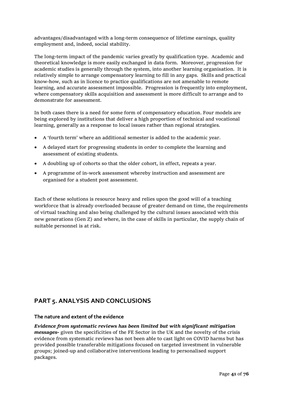
Page 41 of 76
advantages/disadvantaged with a long-term consequence of lifetime earnings, quality
employment and, indeed, social stability.
The long-term impact of the pandemic varies greatly by qualification type. Academic and
theoretical knowledge is more easily exchanged in data form. Moreover, progression for
academic studies is generally through the system, into another learning organisation. It is
relatively simple to arrange compensatory learning to fill in any gaps. Skills and practical
know-how, such as in licence to practice qualifications are not amenable to remote
learning, and accurate assessment impossible. Progression is frequently into employment,
where compensatory skills acquisition and assessment is more difficult to arrange and to
demonstrate for assessment.
In both cases there is a need for some form of compensatory education. Four models are
being explored by institutions that deliver a high proportion of technical and vocational
learning, generally as a response to local issues rather than regional strategies.
• A 'fourth term' where an additional semester is added to the academic year.
• A delayed start for progressing students in order to complete the learning and
assessment of existing students.
• A doubling up of cohorts so that the older cohort, in effect, repeats a year.
• A programme of in-work assessment whereby instruction and assessment are
organised for a student post assessment.
Each of these solutions is resource heavy and relies upon the good will of a teaching
workforce that is already overloaded because of greater demand on time, the requirements
of virtual teaching and also being challenged by the cultural issues associated with this
new generations (Gen Z) and where, in the case of skills in particular, the supply chain of
suitable personnel is at risk.
PART 5. ANALYSIS AND CONCLUSIONS
The nature and extent of the evidence
Evidence from systematic reviews has been limited but with significant mitigation
messages- given the specificities of the FE Sector in the UK and the novelty of the crisis
evidence from systematic reviews has not been able to cast light on COVID harms but has
provided possible transferable mitigations focused on targeted investment in vulnerable
groups; joined-up and collaborative interventions leading to personalised support
packages.